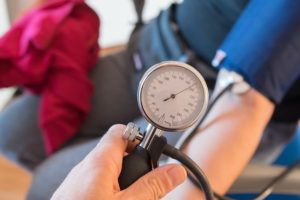 Essential hypertension is the blanket term used when no root cause is found for high blood pressure. As many as 95% of all high blood pressure falls into this category.
Essential hypertension is the blanket term used when no root cause is found for high blood pressure. As many as 95% of all high blood pressure falls into this category.
While essential hypertension is still a mystery to medical science, it has been associated with identifiable risk factors. High blood pressure seems to have a genetic component. Hypertension is more prevalent in men than women. Race also seems to play a roll as well as the effected age group. In the USA, African Americans have been found to be twice as likely as Caucasians to develop HPB. That gap starts to narrow around 45. Past age 65, black women have the biggest incidence of reported high blood pressure.
Knowing the signs of high blood pressure can help you to catch it in its early stages before damage can occur:
While you can have high blood pressure and not know it often (which is why it is called the silent killer) it does sometimes present with symptoms you can identify if you know what you are looking for.
Nosebleeds
Headaches
Dizziness
Feeling shaky
It is important to get your blood pressure checked regularly. If your readings are high consistently it is time to see your doctor. High is considered anything over 120/80.
Diet is a great regulator and holds a strong influence on high blood pressure. Salt is the number one factor in foods. Those with high blood pressure tend to be sensitive to salt and even small amounts can raise the pressure level. Other linked conditions include being overweight, taking hormonal birth control pills, eating fatty foods with too much salt, smoking, excessive drinking, having diabetes, not getting enough movement or exercise in your daily life, and lacking in the minerals magnesium, calcium, and potassium.
While the source may not be able to be identified there are steps you can take to help get your blood pressure in check.
- Check your BP regularly, if it stays high for a period of more than a few weeks consult your physician as leaving hypertension unchecked can lead to damage of the cardiovascular system endangering your health and well-being.
- Reduce salt intake as well as fatty food.
- Get regular cardiovascular exercise. Movement, stretching, even walking daily help.
- Drinking enough water to stay well hydrated. Keep alcohol to a minimum if you must drink at all.
- Get tested for any mineral deficiencies and supplement as needed.
- If all of these suggestions are followed and still your blood pressure continues to be too high you may need pharmaceutical medication for high blood pressure in order to reduce it.
If you suspect you may be dealing with high blood pressure please give the office of Tampa Cardiovascular Associates in Tampa Bay, Florida a call today at 813-975-2800 to schedule your consultation.